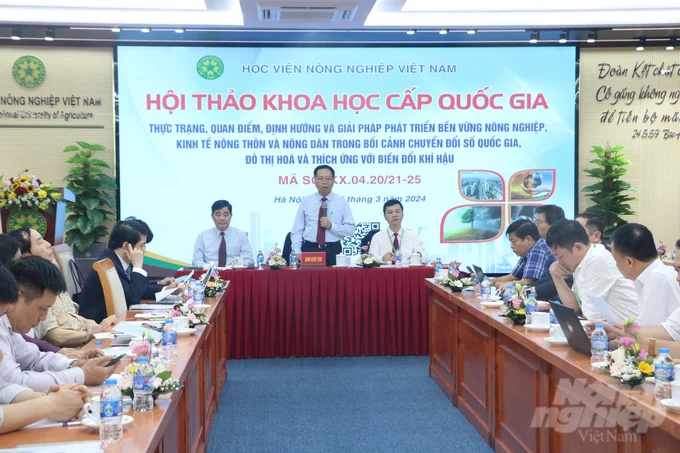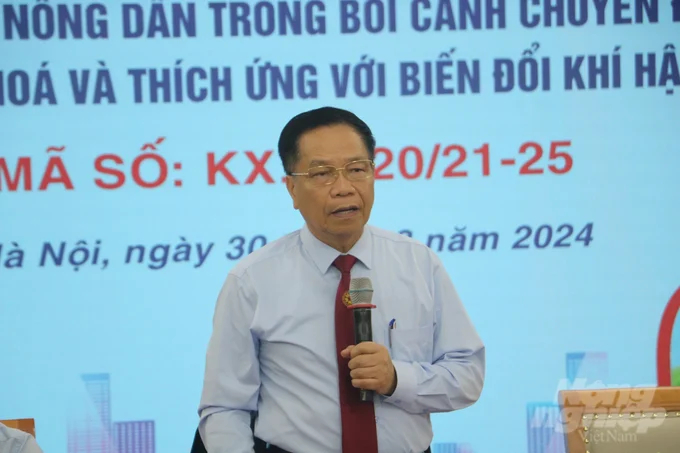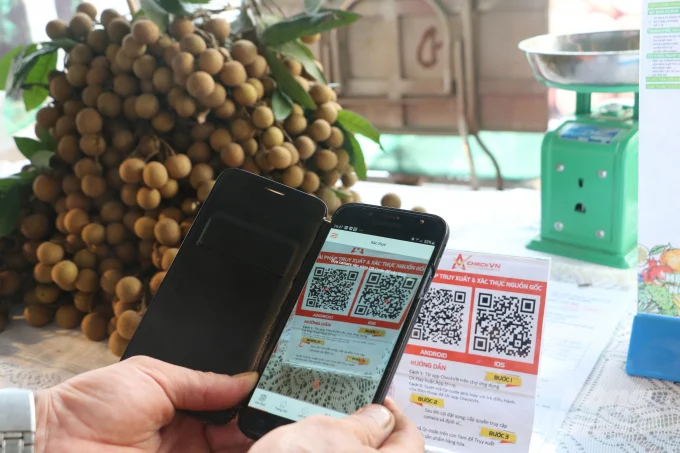May 29, 2025 | 09:51 GMT +7
May 29, 2025 | 09:51 GMT +7
Hotline: 0913.378.918
May 29, 2025 | 09:51 GMT +7
Hotline: 0913.378.918
On March 30, the Vietnam National University of Agriculture organized a National Scientific Conference: Current status of perspectives, orientations and solutions for sustainable development of agriculture, rural economy and farmers associated with national digital transformation, urbanization and climate change adaptation.
Speaking at the Conference, Prof. Dr Tran Duc Vien, Chairman of the Academic Science and Training Council of the Vietnam National University of Agriculture and head of the project K.X04.20/21-25 shared that the purpose of the Conference is to create an academic forum for researchers and lecturers inside and outside the Academy to discuss and create conditions for members to participate in the task of consulting experts to find bottlenecks. They relate to the implementation viewpoints and policies to develop agriculture, rural economy, and farmers associated with national digital transformation, urbanization and adaptation to climate change in recent times.

Overview of the Conference. Photo: Hung Giang.
At the same time, in order to propose new perspectives, directions, and solutions for the sustainable development of agriculture, rural economy, and farmers associated with national digital transformation, urbanization and adaptation to climate change in the coming time.
Also at the Conference, Dr Nguyen Minh Duc, Faculty of Economics and Rural Development (Vietnam National University of Agriculture) pointed out the opportunities and challenges of farmers in the digital transformation process.
According to the research team of the Vietnam National University of Agriculture, opportunities for digital transformation have opened up thanks to the remarkable progress of new technologies from the groundbreaking Industrial Revolution 4.0. Especially in digital technology with the main pillars being cloud computing technology, big data, the Internet of Things, blockchain, artificial intelligence, and virtual reality.

Prof. Dr Tran Duc Vien, Chairman of the Academic Science and Training Council and head of project K.X04.20/21-25 spoke at the Conference. Photo: Hung Giang.
Digital transformation brings many opportunities, but the digital transformation process also has many difficulties and challenges, of which the biggest difficulty of digital transformation is changing perception; second is the institutional challenge related to adapting to the rapid change of digital technology and the real-digital environment and technological challenge relating to the ability to create and master digital technology.
It is known that the Ministry of Agriculture and Rural Development has developed a Digital Transformation Project for the Agriculture sector for the period 2021-2025, oriented to 2030 with 3 main pillars: digital government, digital agricultural economy and digital countryside with digital farmers to achieve the goal of implementing agricultural digital transformation quickly, synchronously and effectively. Digital-conversing subjects include state agencies, businesses, cooperatives and farmers.
In particular, digital transformation will create "digital farmers", who are farmers who use digital technology in their agricultural production process. Digital transformation for farmers means changing the traditional production mindset of farmers to a transparent and responsible agriculture. Digital transformation for farmers is the change farmers make in production processes and consumption of products based on digital technology application software and deeply participating in e-commerce platforms.

Digital transformation opportunities are opened up thanks to the remarkable progress of new technologies from the groundbreaking Industrial Revolution 4.0. Photo: Hung Giang.
Sharing at the Conference, Dr Mai Van Trinh, Director of the Vietnam National University of Agriculture said that to have sustainable agriculture, it is necessary to deploy agricultural production activities that both adapt to climate change, reduce greenhouse gas emissions and meet the internationally committed target of net zero emissions by 2050. We need solutions to select plant and animal breeds to adapt to weather changes, resist drought, saltwater intrusion, and floods, change cropping systems to suit new climatic conditions, change seasonal schedules to avoid extreme climates and add solutions to reduce greenhouse gas emissions such as water management in rice fields, managing fertilizer for crops, improving animal feed, treating livestock waste, managing livestock waste and crop by-products, applying good agricultural practices and organic agriculture...
Translated by Hoang Duy

(VAN) Ms. Nguyen Thi Dung, Deputy Director of Ngoc Hoang Cooperative, shared about the journey of bringing dragon fruit to Europe, achieving annual revenues in the billions of VND.

(VAN) Bamboo products from Thang Tho Bamboo Cooperative have reached many countries around the world, while also creating jobs for local workers.

(VAN) The Management Board of Con Dao National Park reported that a green sea turtle, tagged in the Philippines, has traveled thousands of kilometers to lay 84 eggs on Bay Canh Islet.

(VAN) Green technology is paving a new path for sustainable aquaculture in the Mekong Delta in particular and across the country in general, helping reduce emissions and adapt to climate change.

(VAN) On May 27, La French Tech Vietnam (the French startup and innovation community in Vietnam) held the French Tech Summit Vietnam 2025.
/2025/05/27/4731-2-223159_980.jpg)
(VAN) No votive paper, no styrofoam, no plastic bags, no plastic bottles, and no single-use plastic trays are the key rules tourists should keep in mind when visiting Con Dao.

(VAN) In the fight against plastic pollution, Vietnam has been demonstrating a proactive, pioneering, and active role in addressing the greatest environmental challenge today.